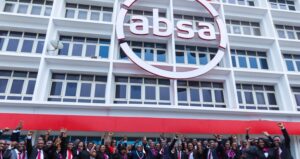Absa Bank Surges to Industry Lead with Highest Q1 Profit Before Tax

Absa Bank Ghana has claimed the top spot in Ghana’s banking sector for the first quarter of 2025, posting the highest profit before tax (PBT) among its peers. The bank’s PBT rose by an impressive 45% year-on-year to GH₵686.5 million, up from GH₵474.8 million in Q1 2024, propelling it from third place at the end of last year to the industry’s most profitable bank.
This performance underscores a strong start to the year, driven by robust income growth and prudent risk management. GCB Bank followed with a PBT of GH₵533 million, marking a 30% increase, while Ecobank Ghana placed third with a modest 4% growth, recording GH₵506 million in profit before tax.

Beyond profitability, Absa stood out for its operational strength. The bank recorded the highest loan-to-deposit ratio in the sector at 40.4%, reflecting a strong commitment to financing the Ghanaian economy. This compares favourably with its Non-Performing Loan (NPL) ratio of 15%, which is significantly lower than the industry average of 21.8%, as highlighted in a recent Fitch Solutions report.
Fitch’s analysis, titled “US Tariffs Increase Risk for Sub-Saharan African Banks”, pointed to high NPL levels and relatively low capital adequacy as major vulnerabilities in Ghana’s banking sector. However, Absa’s capital adequacy ratio of 23.3% places it in a strong position. By comparison, GCB Bank reported a capital adequacy of 18% with a 14.9% NPL ratio; Ecobank posted 16.8% and 24% respectively, while Stanbic had a healthy 23.9% capital buffer but a higher NPL of 22%.
In terms of operational efficiency, Absa again led with the lowest cost-to-income ratio at 38%, ahead of Stanbic (47.2%), GCB (51.6%), and Ecobank (51.7%). Rising inflation continues to pressure bank cost structures, but Absa’s performance indicates superior cost management and revenue optimization.
Absa also posted a 61% jump in fee and commission income, contributing to its growing non-interest income base—a key focus for banks seeking to diversify revenue streams amid evolving market dynamics.
The bank’s strong balance sheet, combined with a disciplined lending strategy and expanding client base, positions it as a key player in Ghana’s financial landscape as the sector navigates reforms and recovery.
Fitch anticipates a decline in interest rates across Sub-Saharan Africa in 2025, which could improve asset quality and spur further loan growth. In this environment, Absa’s Q1 performance offers a strong foundation for continued leadership in profitability, efficiency, and stability.




